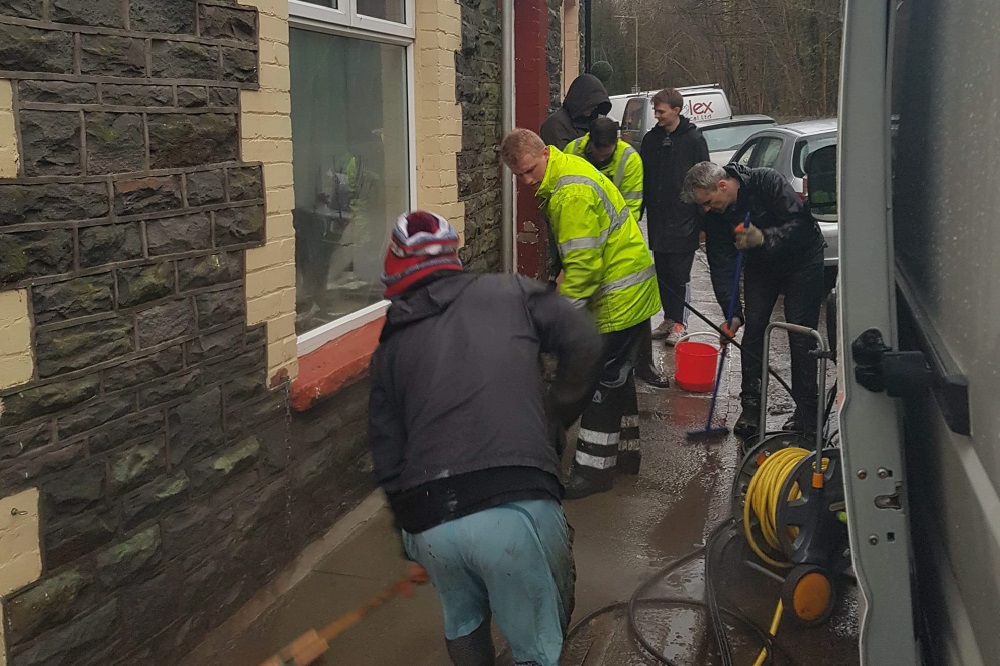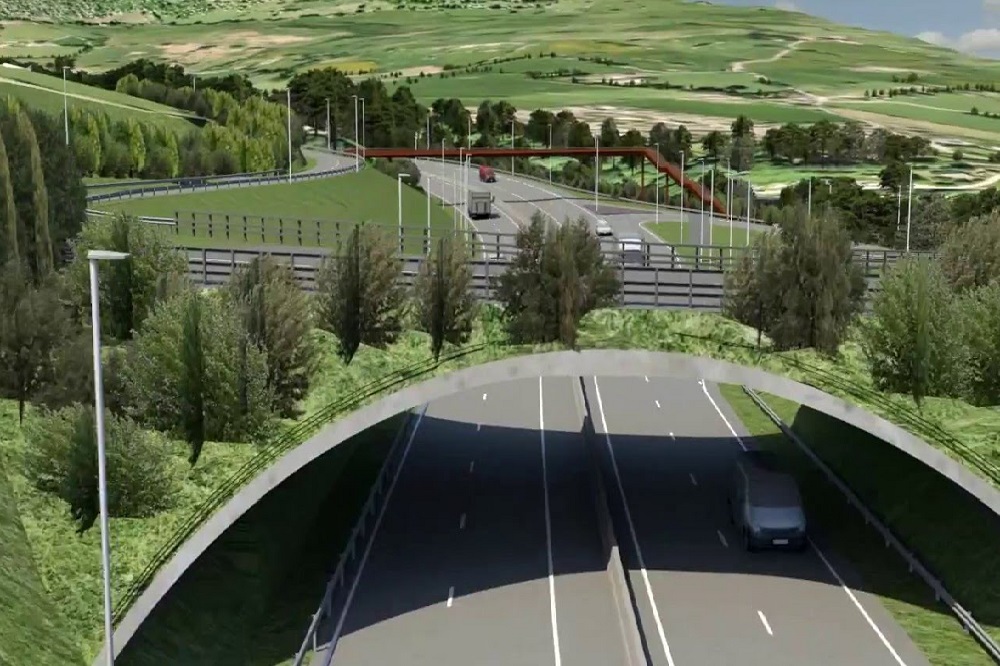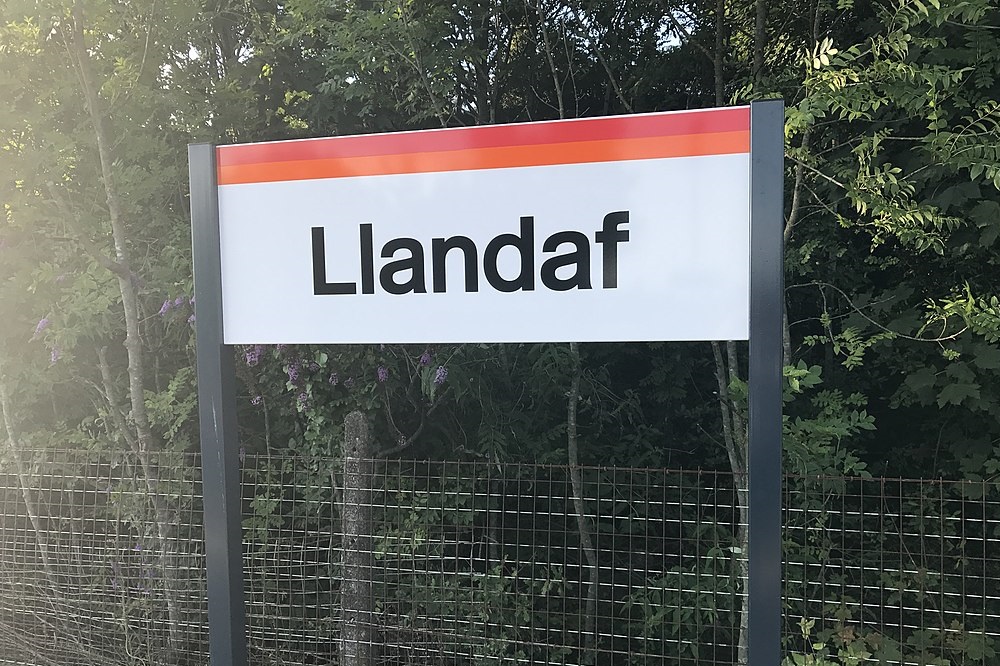Today’s Senedd roundup: Flooded households can claim up to £1,000 emergency Welsh Government funding

Owen Donovan, Senedd Home
Following yesterday’s First Minister’s Questions, the Environment, Energy & Rural Affairs Minister, Lesley Griffiths (Lab, Wrexham), updated the Senedd on the practical measures being undertaken on the ground by Welsh and local government in the aftermath of storms Ciara and Dennis.
“Lucky no one was killed”
In terms of the key points:
- Natural Resources Wales issued more flood warnings than ever before, with the rivers Taff and Usk reaching their highest levels in 40 years.
- 1,000 homes and 300 businesses are confirmed to have been directly affected, but there’s been further flash flooding in Dolgellau and Bangor-on-Dee near Wrexham so the threat hasn’t passed.
- £10 million has been made immediately available by the Welsh Government and households affected by flooding can claim up to £1,000 (depending on their insurance status) from the Welsh Government’s flood relief scheme – more details here.
The Minister provided an update on the success of current flood prevention measures and concerns about coal tip stability following some landslides.
Shadow Environment Minister, Andrew RT Davies AM (Con, South Wales Central), asked when there will be a final figure for the cost of the floods? There were also issues around how often key infrastructure was maintained, with blocked culverts being blamed for causing flooding in Pentre in the Rhondda.
The latter point was echoed by Leanne Wood AM (Plaid, Rhondda), with residents often left to take matters into their own hands because help couldn’t reach them. She warned that some households could end up in fuel poverty for having to run energy-intensive dehumidifiers to dry their properties.
“We have in Rhondda Cynon Taf 557 flooded homes – 25% of the UK total. We have 500 flood-damaged business properties, and the businesses damaged alone in one area of Treforest, where something like 90% of the businesses were affected, is potentially estimated at around £100 million to £150 million. So, the guesstimate from the council….is in the region of £30 million to £40 million of damage, but I suspect it is going to be considerably more once those inspections are completed.”
– Mick Antoniw AM (Lab, Pontypridd)
Postcode lottery in flood support?
While not one of the 2016 intake, UKIP AMs were elected off the back of a manifesto commitment (pdf – p37) to scale back inland flood defence spending and concentrate on housing bans on flood plains, dredging and “building flood-resilient buildings”. The Brexit Party seemingly inherited that policy, with Mandy Jones AM (BXP, North Wales) called for dredging in the River Dee to resume.
“We have very fast-moving rivers. They’re short. The energy they possess is astonishing, and quite frankly, some of the culverts are not fit for purpose for the speed of the water flow. We need to look at these watercourses and examine them in the whole system, about what can be done to deepen them and strengthen them and move that water away from the areas at most risk around businesses and homes.”
– David Melding AM (Con, South Wales Central)
The spiciest exchange took place between the Minister and Janet Finch-Saunders AM (Con, Aberconwy), the latter implying that financial assistance was only made available following Storm Dennis, not Storm Ciara (which badly affected the Conwy Valley) and there was no mention of support for flood-hit farms.
The Minister said any funding had to be properly audited and accounted for, but due to the tone of the Tory AM’s question, she refused to expand further. However, Llyr Gruffydd AM (Plaid, North Wales) made a similar point and warned that a postcode lottery was developing where some local authority areas provide more assistance than others even when the impact of flooding is the same.
Many other AMs described how the storms affected their constituencies and regions – usually praising the response of their respective communities or local authorities – though Vikki Howells AM (Lab, Cynon Valley) pleaded for households in flood-risk areas to be made more aware of the affordable insurance scheme Flood Re.

Welsh Government infrastructure projects take too long to deliver
Here’s a round-up of this week’s questions to Economy & Transport Minister, Ken Skates (Lab, Clwyd South).
In light of recent news on the rising costs of the A465 project and ahead of a Tory debate on roads, Shadow Economy Minister, Russell George AM (Con, Montgomery), wondered why cost overruns and delays were becoming a feature of Welsh infrastructure projects?
The Minister accepted that opposition AMs would be critical of these delays and they have a right to scrutinise. He was, however, confident the costs of the A465 Gilwern-Brynmawr section wouldn’t rise any further:
“….the scheme budget remains as it was in my statement in April of last year. The budget remains the same: no further increase, despite the delay that was announced very recently. It’s also worth reflecting on the fact that this particular project is now more than 85% complete, with construction of more than 7.5 miles of retaining walls; something in the order of 1.3 million m3 of material has been excavated, and there has been the laying of 16,000m3 of concrete; 30,000 trees have been planted and 15 bridges have been constructed. It’s a huge endeavour.”
– Economy & Transport Minister, Ken Skates
Market to be incentivised to install electric charging points
Continuing the discussion from yesterday, Helen Mary Jones AM (Plaid, Mid & West Wales) asked whether the Amman and Gwendraeth valleys would be included in any Swansea Bay Metro (a feasibility study having been promised in a budget deal with her party)?
The Minister was non-committal but said all four local authorities in the area were involved in developing the metro plans and the aim is for the reach of the Swansea metro to be as wide as possible.
Another deal regarded electric charging points:
“….in the final budget deal with the Welsh Government, we agreed not to oppose the budget, and one of the conditions of that was £2 million to be allocated to improving electric vehicle charging points across Wales….This was a commitment to a substantial investment, and I wonder if the Minister can tell us today what has been done with that investment, and how does he account for the fact that we have such low (number of charging points) in some of those communities that need it most?”
– Helen Mary Jones AM
The Minister said the £2 million has been used to incentivise the market to deliver solutions instead of funding the installation of charging points. That way it could ensure more than £2 million worth of charging points are installed. An electric vehicle charging strategy is due later this year.
Strong foundations
David Rowlands AM (BXP, South Wales East) asked for an update on the foundational economy. He noted some scepticism that even with a focus on the foundational economy, some towns may struggle to catch up economically with the M4 corridor. Did the Minister think this analysis was correct?
The Minister believes that what makes the foundational economy different from previous big economic ideas in Wales is that it focuses more on communities that have been left behind with a greater emphasis on the quality of work rather than quantity.
He pointed to statistics which showed Welsh unemployment at record low levels and household incomes rising faster than the UK average as signs the Welsh Government has been investing smartly in the right areas.

More details on metro projects
Yesterday, Economy & Transport Minister, Ken Skates (Lab, Clwyd South) updated the Senedd on the three metro projects.
Big plans, bigger bill
In summary:
- The next phase of the South Wales Metro project has started, focusing on electrification, new trains and improved service frequency. Control over the Valley Lines will be transferred to the Welsh Government by the end of March 2020.
- The Borderlands Line between Wrexham and The Wirral will form the “spine” of the North Wales Metro to provide through-services between Wrexham and Liverpool (up to four-per-hour). The proposals include an integrated bus service – including a long-distance, possibly segregated, bus rapid transit route between Deeside and Rhyl – a new station at Deeside Industrial Park and “co-locating activities” in and around Wrexham General station.
- Transport for Wales is working on measures in Swansea Bay, with the Minister suggesting passenger services will be introduced on the Swansea District Line. Again, this will include an integrated bus service.
While there was a lot the Welsh Government can do with its own funding, many levers and budgets remain with the UK Government.
“Plans by the UK Government to increase spending on infrastructure in this Parliament are very welcome, and Wales’s share of this will amount to some £3.7 billion. With this funding, and a fair share of the HS2 spend over the next 10 years, we will deliver our plans to transform urban and inter-city connectivity in Wales.”
– Economy & Transport Minister, Ken Skates
Shadow Economy Minister, Russell George AM (Con, Montgomery), was keen to know what progress has been made? The north Wales metro was announced three years ago, so would there be a proper timetable for these projects?
While Plaid Cymru agreed with the Minister that there was clearly an issue with historic underfunding by the UK Government, Helen Mary Jones AM (Plaid, Mid & West Wales) and the Minister got into a bit of an argument over High Speed 2 and who was first to stake Wales’ claim for a fair proportion of funding relating to it.
Adam Price AM (Plaid, Carms E. & Dinefwr) later added that the Welsh Government had reneged on a budget agreement promise to undertake a feasibility study on integrating the Swansea, Neath and Gwendraeth valleys into the Swansea Bay metro.
David Rowlands AM (BXP, South Wales East) hoped there was a consultation on business needs, particularly the requirement for speedy transport under a “just in time” supply system. Meanwhile, Jack Sargeant AM (Lab, Alyn & Deeside) welcomed the proposals in Flintshire, he hoped that more rural towns and villages away from the Borderlands Line wouldn’t be left out.
Mark Isherwood AM (Con, North Wales) thought there could be better linking in with decarbonisation policies as only two double chargers are being provided at the Deeside park and ride.
In response to a question from Mick Antoniw AM (Lab, Pontypridd) on the UK Government’s “reverse Beeching fund”, the Minister was keen to point out that the £500 million earmarked for that (in England) wouldn’t go any way to delivering much.
Support our Nation today
For the price of a cup of coffee a month you can help us create an independent, not-for-profit, national news service for the people of Wales, by the people of Wales.





Re:”Welsh Government infrastructure projects take too long to deliver”
Passenger services from Carmarthen to Aberystwyth? Talked about since the last freight train out of the Felin Fach Creamery in 1973. Scoping Study in 2015 (£30,000 to AECOM). Feasibility Study, Sept 2017-Dec 2019 (£300,000 to Mott Macdonald). Where will the can be kicked to next: the National Infrastructure Commission for Wales “State of the Nation” report promised by November 2021?